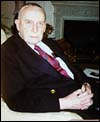Claims have been made that about 500,000 people died during Partition. It was nothing of that sort
 Fifty years ago, he set out on a mission with Lord Mountbatten,
the man given the difficult task of burying the British Empire in India. Alan Campbell-Johnson, the last viceroy's press attache, is one of the few surviving eyewitnesses to history, those tumultous months when India became free.
Fifty years ago, he set out on a mission with Lord Mountbatten,
the man given the difficult task of burying the British Empire in India. Alan Campbell-Johnson, the last viceroy's press attache, is one of the few surviving eyewitnesses to history, those tumultous months when India became free.
At his tastefully decorated apartment on Ambrosden Avenue, near Westminster Cathedral in central
London, Campbell-Johnson, who will be 84 in July, spoke to Amberish K Diwanji about Partition, Gandhi, Nehru and Patel.
The violent birth
The Independence of India was unique, it was a battle fought on
the principles of non-violence, led by a man whom many today consider
a saint, Mahatma Gandhi. Yet, what was largely a peaceful struggle for
Independence, ended in brutal bloodshed as the the new nation
was divided into two countries along religious lines. Hundreds of
thousands died as millions migrated eastwards or westwards, depending
upon their faith.
There was bewilderment that the British, who ran undivided
India like clockwork, could not control the horrific violence. Fingers were
pointed at London for its callousness, but more specifically at
the man in charge, Lord Mountbatten, for trying to rush things and thereby
causing bloodshed.
Campbell-Johnson strongly disagrees. "We did not leave too
early. Even the slightest delay would mean leaving too late. When Mountbatten
accepted the assignment, the tentative date set was June 1948. But on reaching
India in March 1947, he found that 1948 was too far, it would have to be
the same year, the sooner the better. Delays would have caused greater
mayhem, not less."
"Many of Mountbatten's critics do not understand that Mountbatten's
task was a political one, not administrative. His job was to find a
solution to the transfer of power. And once a political settlement had been
reached, the administrative consequences became clear," he continues.
Certainly a statement that not many would agree with. The British could have stayed a little longer, acted more firmly in putting down violence, surely?
"How could you do that?" questions Campbell-Johnson. "Within
hours of reaching the the political settlement on June 3, 1947, the interim government
virtually collapsed. What on earth was Liaquat Ali Khan going to
do as finance minister in the cabinet with Jawaharlal Nehru as prime
minister? So you would have to govern India under Section 93 imposing martial
law. How could you govern a country on the verge of Independence under
martial law?"
From June 3 to August 15 was just 73 days. Perhaps more time
would have given the people time to come to terms with their new nations
and move across in a more peaceful method. Campbell-Johnson dismisses the
suggestion. "Once Partition was accepted, including the
partition of the Punjab state, the Sikhs were in total revolt. We were dealing
with a situation where we feared a collapse of law and order across the
subcontinent. More delays only meant more trouble. We ensured
that the violence overall affected only 3 per cent of the country."
The Sikhs were also the ones who suffered and lost the most, their
political leadership in disarray. "Their own situation in
the state was such that they simply would not accept the agreement. But what
other option did they have? If they had asked for sovereignty, it would have
been refused by both India and Pakistan."
Campbell-Johnson recalls the meeting between the then governor
of the Punjab and Mounbatten, when the viceroy was told that partitioning
Punjab would lead to trouble. "Mountbatten replied that
he had to think of the whole country when making a decision," said Campbell-Johnson.
 However, that is little consolation for those hurt, and the hundreds
of thousands who died. Campbell-Johnson adds a caveat on the number
of dead.
However, that is little consolation for those hurt, and the hundreds
of thousands who died. Campbell-Johnson adds a caveat on the number
of dead.
"Claims have been made that about 500,000 people died during Partition.
It was nothing of that sort. I was part of the Emergency Committee set
up to monitor the situation, and let me say here that most of the violence
took place in a period of two and a half months, during which time
about 200,000 people were killed. There are noted historians who agree with
the same figure."
Campbell-Johnson feels, and most Indians would agree, that the
situation began to deteriorate after the British accepted the communal electorate
system. "You are justified in asking how such a scenario
was allowed to develop in the first place. It was a crisis in the making
for five years, even longer. For this, everyone was responsible to some
measure: the British administration before the war, the Congress during the
war, and the Muslim League after the war."
Photographs of Alan Campbell-Johnson: Amberish K Diwanji
|

